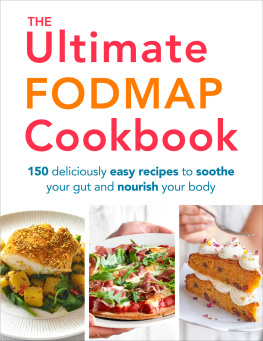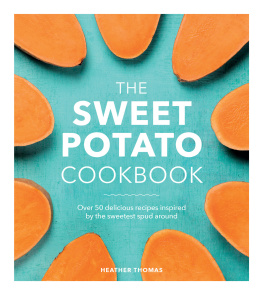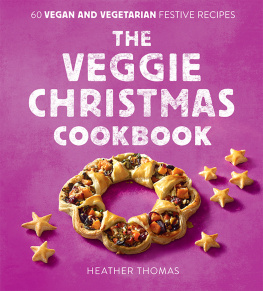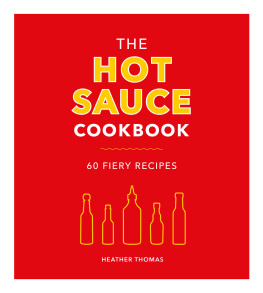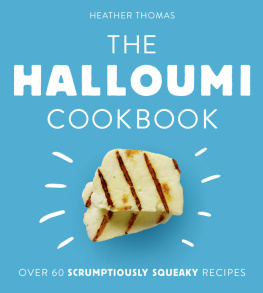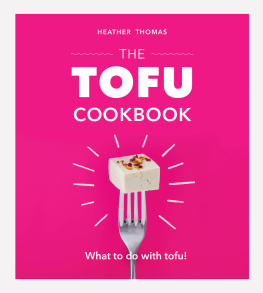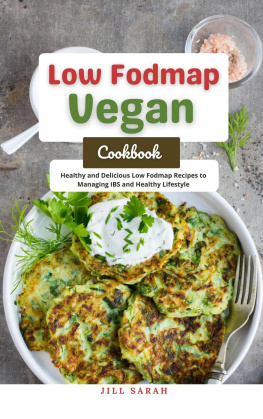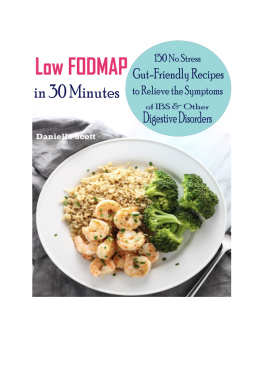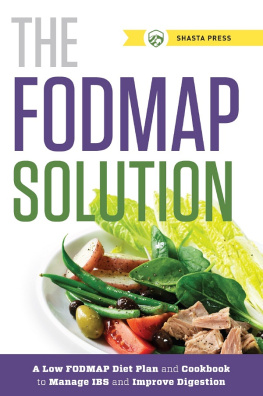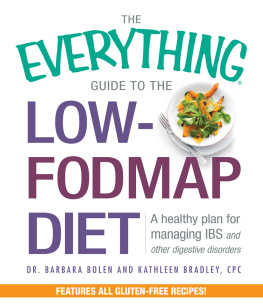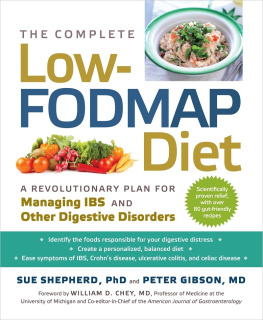ABOUT THE AUTHOR Heather Thomas is a health and cookery writer and editor who has worked with all the major slimming organisations in the UK, including Slimming Magazine, Slimming Clubs, Weight Watchers, Slimming World, Rosemary Conley, LighterLife, Scottish Slimmers, Unislim, Cambridge Weight Plan and Tesco Diets. She is the author of
The Avocado Cookbook (Ebury, 2016) and
The Chickpea Cookbook (Ebury, 2017),
The Sweet Potato Cookbook (Ebury 2017),
The Hot Sauce Cookbook (Ebury 2018). Heather has worked with many top chefs, nutritionists and womens health organisations and charities, and has contributed to health and food magazines in the UK and the United States. She practises what she preaches and eats a very healthy diet and stays slim and fit. ABOUT THE BOOK
HEALTHY GUT, HAPPY BODY If you suffer from digestive issues like IBS and Crohns disease, chances are not many types of food will agree with you and you might feel like your recipe options are limited. Now, thanks to
The Ultimate FODMAP Cookbook, you no longer have to miss out on delicious food.
The only scientifically-proven way to a healthy and happy gut, the recipes in The Ultimate FODMAP Cookbook are based on extensive research carried out at Monash University in Melbourne. All dishes follow the low-FODMAP diet and eliminate the foods likely to aggravate your stomach. With 150 simple, tasty and nourishing recipes, from breakfast to dinner and everything in between, you are certain to find something that hits the spot. Whatever cuisine you enjoy, youll find innovative, healthy and delicious recipes that will leave you feeling light, bright and better than ever.
INTRODUCTION
The low FODMAP diet is a scientifically proven and effective way of managing and reducing the symptoms of IBS (irritable bowel syndrome) and other bowel diseases and disorders, including coeliac disease, ulcerative colitis and Crohns disease. If you suffer from these digestive problems, eating the low FODMAP way wont cure you but it will ease your symptoms and help make you feel healthier and better and you can still enjoy your food.
Its simple once you identify your trigger foods and cut them out of your everyday diet. FODMAP is an acronym that stands for a group of poorly absorbed short-chain carbohydrates: Fermentable Oligosaccharides, Disaccharides, Monosaccharides And Polypols. When these are fermented in the colon, they can cause discomfort, bloating, wind and diarrhoea. Cutting them out of your diet altogether, or reducing the amount you consume, can bring relief or even eliminate the symptoms altogether. To get the best results, you should follow the diet with a specialist dietitian; talk to your doctor about a referral. On the FODMAP diet, some foods are safe to eat while others should only be eaten in moderation or avoided completely.
Look at the charts to find out which foods you can eat freely and which you should restrict (maximum amounts are stated). It looks a bit complicated at first, but youll soon get the hang of it as you start cooking and putting it into practice. The recipes featured in this book are all easy to make and dont require any specialist skills or techniques. They will help you to navigate the diet and teach you how to cook without everyday ingredients, including onions, garlic, flour and pasta that contain gluten or dairy foods with lactose. Theres lots of choice and whatever your food preferences youll find delicious, healthy recipes that you cant wait to try out.
COOKING & EATING THE FODMAP WAY
Here are some practical tips and advice to help you cook and eat the FODMAP way.
Its not complicated or time-consuming and the guidelines will soon become second nature to you. . Use garlic-infused oil to add flavour to a sauce, salad dressing, stir-fry or a savoury dish. . Add some snipped chives when youre cooking or sprinkle them over the finished dish just before serving for a mild oniony flavour. .
To intensify the onion flavour, you can use the chopped or sliced green parts of leeks and spring onions (scallions) in small quantities. . To intensify the garlic flavour in salads, you can rub a cut clove around the inside of the bowl before adding the salad leaves and vegetables. . Always use onion-free stock cubes and bouillon powder check the labels carefully before purchasing. .
Check the labels for hidden onion or garlic on spice blends, gravy, marinades, sauces, potato crisps (chips) and rice crackers. . Use FODMAP-friendly seasonings and flavourings instead of onion and garlic: herbs, spices, lemongrass, sumac, poppy and sesame seeds, vanilla, etc. . You can make great low FODMAP curries using strongly flavoured ingredients such as galangal, Thai fish sauce, kaffir lime leaves, curry leaves, ground spices, fresh root ginger and coconut milk. . .
If you are lactose-intolerant, choose lactose-free alternatives to milk, yoghurt, cheese and other dairy products. . Eat gluten-free bread and pasta and use gluten-free flour when cooking. . Check the labels on food products for wheat and gluten. canned soup, bottled sauces, dressings and marinades and processed meat. . .
Soy products can be a little confusing on a FODMAP diet some can contain high levels of oligosaccharides, but manufacturing processes will greatly reduce the FODMAP content. As a rule of thumb, tempeh, firm tofu (as opposed to silken), miso and soy lecithin are low-FODMAP. Soy milk made from soy protein is OK too, but watch out for soy milk made from whole or hulled soybeans.
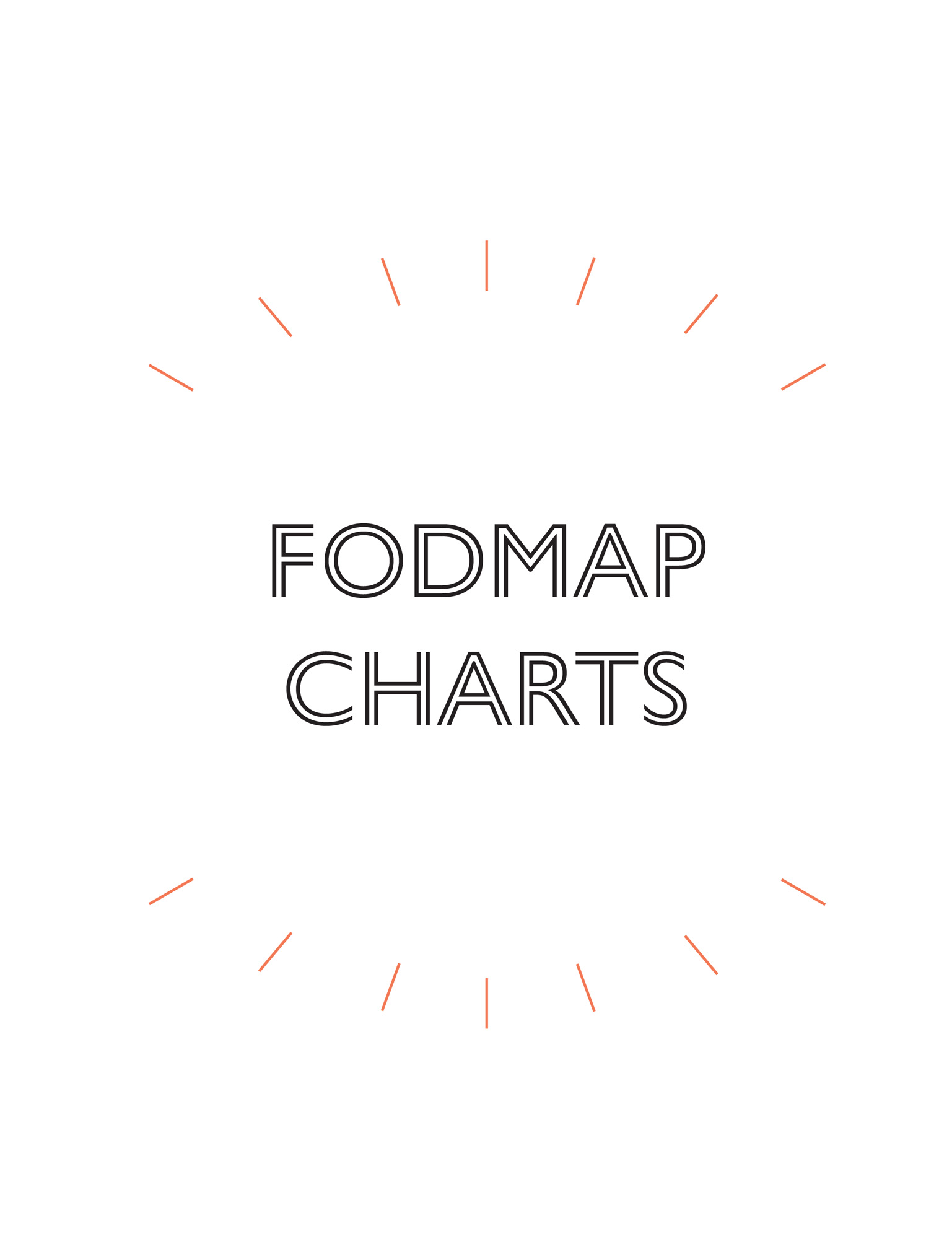
LOW FODMAP: EAT FREELY MEAT & POULTRY Bacon Beef Chicken Ham Lamb Pork Prosciutto Turkey FISH & SHELLFISH All fresh fish All fresh shellfish Canned tuna VEGETARIAN PROTEIN Quorn food products, e.g. mince Tempeh Tofu VEGETABLES Alfalfa Aubergines (eggplants) Bamboo shoots Bean sprouts Carrots Celeriac (celery root) Chicory Chilli Chinese leaves (Chinese cabbage) Chives use instead of onion Courgettes (zucchini) Cucumber Endive Ginger Green beans Kale Leeks green leaves only Lettuce Marrow Olives Pak choi (bok choy) Parsley Parsnips Peppers (bell peppers) Potatoes Pumpkin Radicchio Radishes Rocket (arugula) Seaweed/nori Spinach Spring onions (scallions) green leaves only Squash all varieties except butternut Swede (rutabaga) Swiss chard Tomatoes, fresh and canned (not cherry) Turnips Water chestnuts Watercress Yams FRUIT Ackee Bananas Blueberries Breadfruit Clementines Cranberries Grapefruit Guava Kiwi fruit Lemons Limes Mangoes Melons all except watermelon Oranges Papayas (pawpaw) Passion fruit Raspberries Rhubarb Strawberries Tamarind DRIED FRUIT Banana chips Cranberries Currants Papaya (pawpaw) Pineapple Raisins Sultanas (golden raisins) GRAINS & CEREALS Arrowroot Breadcrumbs gluten-free only Buckwheat flour and noodles & soba noodles Corn chips/tortillas/flakes Cornflour (cornstarch) Cornmeal Millet Oatcakes Oats porridge and oat bran Polenta Popcorn Porridge Potato flour Pretzels Quinoa Rice brown, white, basmati; noodles & vermicelli; flour; rice bran Rice cakes Sorghum Soy flour Tapioca including flour Wheat-free or gluten-free pasta Wheat-free or gluten-free bread, e.g. aspartame, stevia Asafoetida powder (onion substitute) Baking powder gluten-free if on gluten-free diet Bicarbonate of soda (baking soda) Capers Chocolate dark only Chocolate spread Cocoa powder Coffee Fish sauce (nam pla) Gelatine Ghee Golden syrup (corn syrup) unless high-fructose Herbs Jam fructose-free only Maple syrup Marmite Mayonnaise (plain) Miso paste Molasses Mustard Oils all, including garlic-infused, if wished, for flavouring Oyster sauce Salt Shrimp paste Soy sauce gluten-free if on gluten-free diet Spices Stock onion-free only Sugar Sweet & sour sauce Tamari Tamarind paste Tea Vanilla extract Vinegar Wasabi Worcestershire sauce DAIRY Butter Cheese blue cheese, Brie, Camembert, Cheddar, cottage, feta, goats, mozzarella (buffalo for lactose-intolerant), Parmesan, Swiss Eggs Margarine Milk whole/semi-skimmed/skimmed or lactose-free, soya milk (if tolerated) or suitable plant-based, e.g. almond milk Sorbet made from low-FODMAP fruit Yoghurt lactose-free or Greek yoghurt EAT IN MODERATION (IF TOLERATED) VEGETABLES Asparagus 3 spears max Avocados max Beetroot (beets) medium Broccoli 150g/ cup max Brussels sprouts 2 max Butternut squash 60g/2oz ( cup) max Cabbage, Savoy 150g/5oz (1 cup) max Cauliflower in small amounts only Celery in small amounts, e.g. 1 stalk Fennel 100g/3oz max Mangetout (snow peas) 10 pods max Mushrooms in small amounts only Peas 60g/2oz (generous cup) max Sweetcorn cob max Sweet potato 90g/generous 3oz (scant cup) max Tomatoes, sun-dried 4 pieces max LEGUMES Canned chickpeas: 20g/scant 1oz (18 cup), well rinsed, max Canned lentils: 20g/scant 1oz (18 cup), well rinsed, max FRUIT Grapes 10 max Pineapple in small amounts, e.g. 1 slice Pomegranates seeds from small GRAINS & CEREALS Oatmeal 60g/2oz ( cup) max NUTS & SEEDS Almonds 10 max Brazil nuts 1 handful max Chestnuts 1 handful max Hazelnuts 10 max Macadamia nuts 1 handful max Peanuts 1 handful max Pecans 10 max Pine nuts 10 max Walnuts 1 handful max Seeds most kinds (hemp, pumpkin, sunflower, etc.) 1 handful max STORE CUPBOARD Chocolate 3 squares milk or white max Chutney 1 tbsp max Peanut butter 2 tbsp max Pesto sauce less than 1 tbsp max Seed butters 2 tbsp max DAIRY Cream 120ml/4fl oz ( cup) max Cream cheese 50g/2oz ( cup) max Ricotta 2tbsp HIGH FODMAP: DONT EAT! MEAT All processed meats, such as sausages, chorizo, salamis and pepperoni Sausages VEGETABLES Artichokes Broad beans Garlic Leeks (white stems) Okra Onions Shallots Soybeans Spring onions (white stems) Sugar snap peas Tomatoes, cherry VEGETARIAN PROTEIN Some soy products (unless tolerated) (see note ) LEGUMES Chickpeas cooked from dry Falafel Lentils cooked from dry All other legumes, dried or canned, e.g. kidney, black, cannellini, butterbeans (lima beans), broad beans (fava), haricot (navy), aduki, soy, etc. kidney, black, cannellini, butterbeans (lima beans), broad beans (fava), haricot (navy), aduki, soy, etc.

